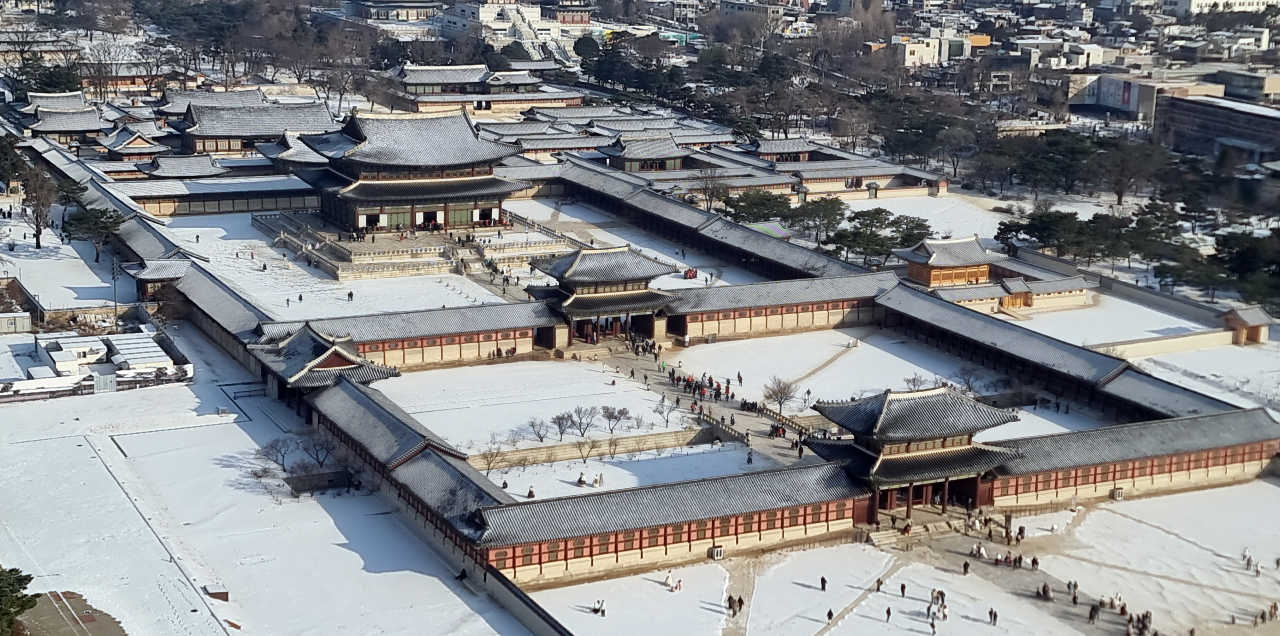 |
Snow covers Gyeongbokgung in Jongno-gu, Seoul on Wednesday. (Yonhap) |
Temperatures are expected to drop significantly from Thursday as the cold weather continues to persist in the central region, with heavy snow forecast in southwestern parts of South Korea until Friday, according to the national weather agency on Wednesday.
As the continental high pressure builds, cold air will begin to move toward the west, causing snow clouds that have formed along the west coast to move inland, it said. This will cause snow to fall near the west coast of South Chungcheong Province, western parts of North and South Jeolla Province and Jeju Island, it added.
In South Chungcheong Province, snow will fall until Thursday evening, while the other regions will see snow until Friday evening.
South Korea's Ministry of the Interior and Safety has escalated the snowstorm crisis alert level from "caution" to "warning" as of 8 p.m. on Wednesday.
The ministry also raised the emergency response level of its Central Disaster and Safety Countermeasures Headquarters to level two, the intermediate level in its three-stage system.
The ministry had elevated the snowstorm crisis alert level from "attention" to "caution" at 10 a.m. on the same day.
Up to 5 to 15 centimeters of snow are expected to fall on the west coast of South Chungcheong Province, according to the national weather agency. Western parts of North Jeolla Province are predicted to see 10 to 30 centimeters of snow, and western parts of South Jeolla Province expect to see 5 to 20 centimeters of snow. Mountainous regions in Jeju Island expect to see up to 30 to 50 centimeters of snow, while coastal regions in the island expect to see 5 to 10 centimeters of snow.
“As large amounts of snow will accumulate over a few days, everyone must stay cautious of accidents that may arise due to facilities being prone to damages and ice being formed on roads,” said the Korea Meteorological Administration during Wednesday’s press briefing.
Wednesday’s temperatures reached as low as minus 11 degrees Celsius with a high of 4 C, similar to average temperatures in previous years.
However, an arctic cold wave is expected to hit Korea with average temperatures reaching as low as 20 C. This is because the cold continental pressure will begin to reassert itself from northern China, bringing cold air into Korea, according to the KMA.
In Seoul, low temperatures are expected to reach as low as minus 15 C. In Daejeon, low temperatures are expected to reach as low as minus 13 C, while Gwangju's and Busan’s morning lows are expected to be around minus 7 C. The highs are also estimated to be between minus 10 C to 1 C.
“Due to strong winds, it will feel 5 degrees colder than the actual temperature,” said the KMA. “A cold wave warning will be issued nationwide as temperatures will drop around 10 degrees more than the previous days.”
Temperatures that record minus 15 C and below are likely to continue through Christmas Eve. According to the KMA's forecasts, morning lows on Dec. 22-24 are predicted to range between minus 17 C to minus 2 C, with high temperatures ranging between minus 7 C and 6 C.







